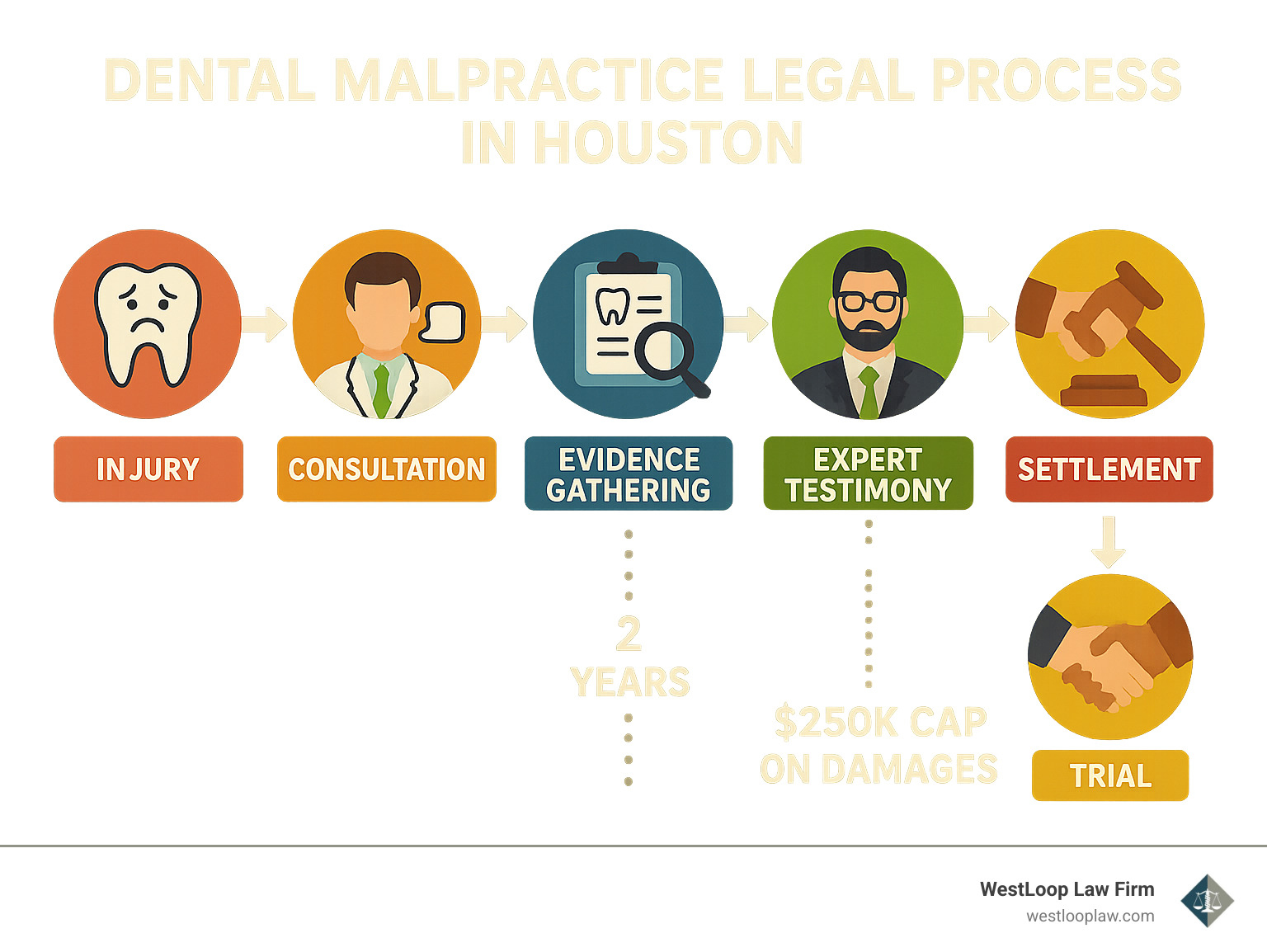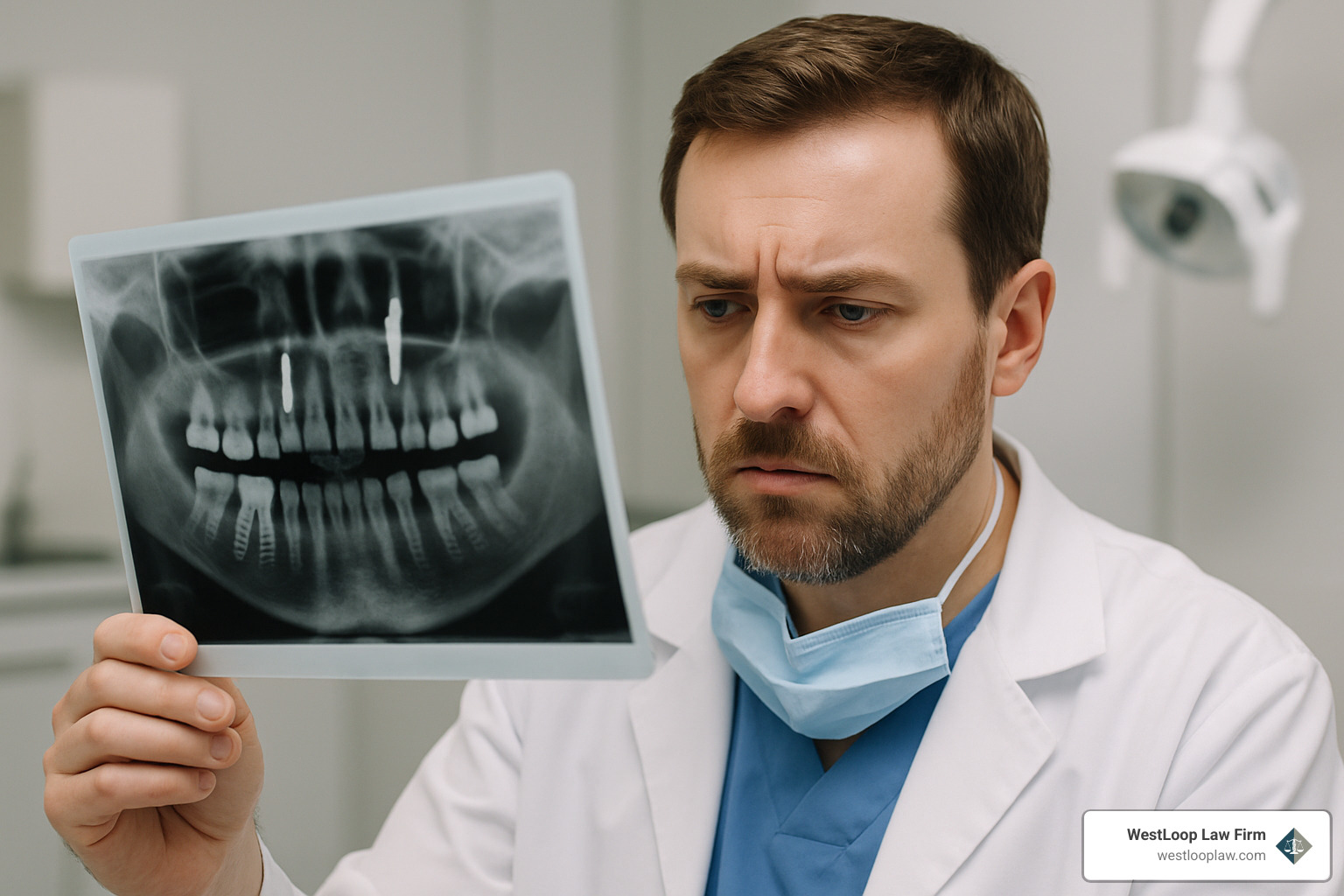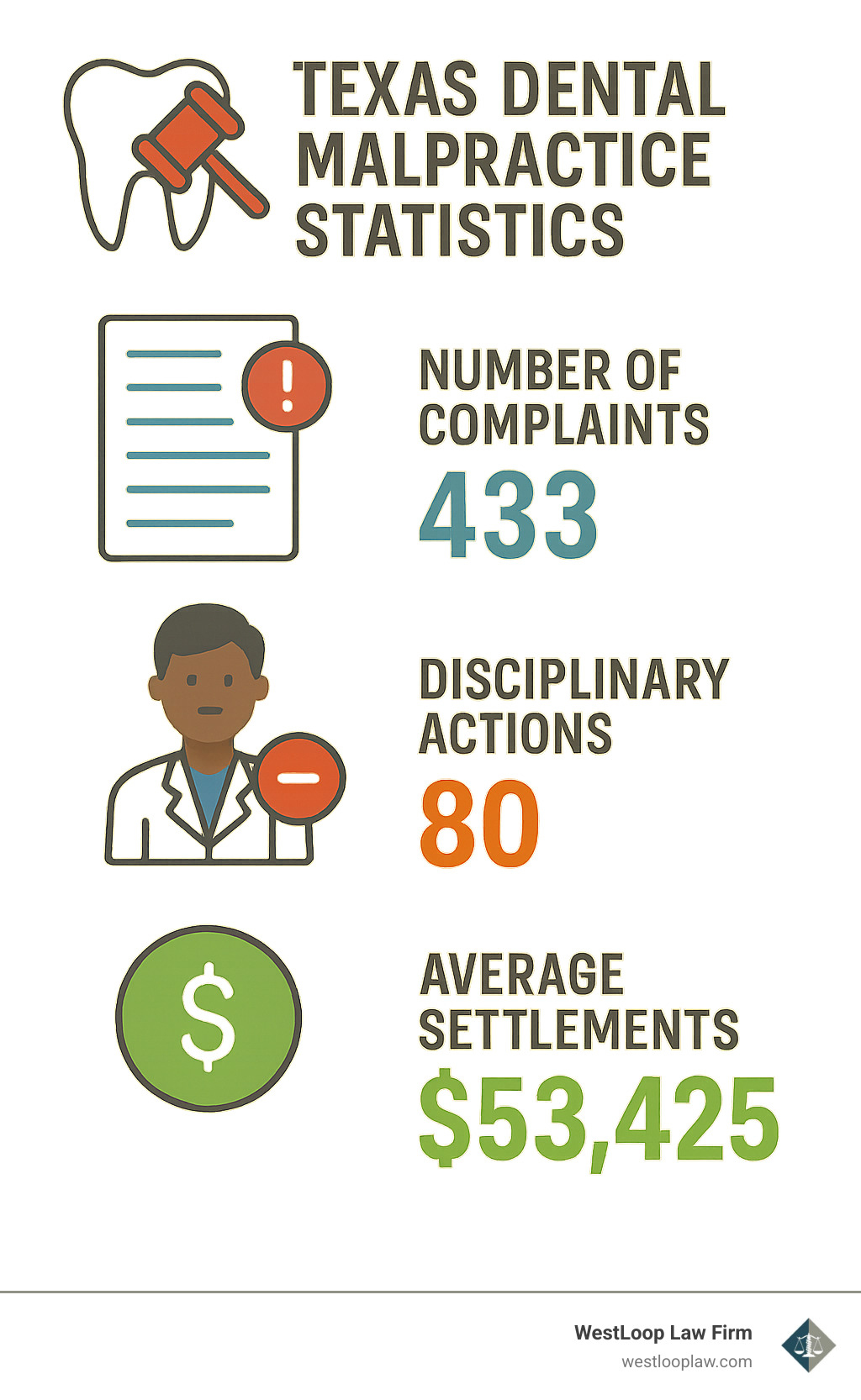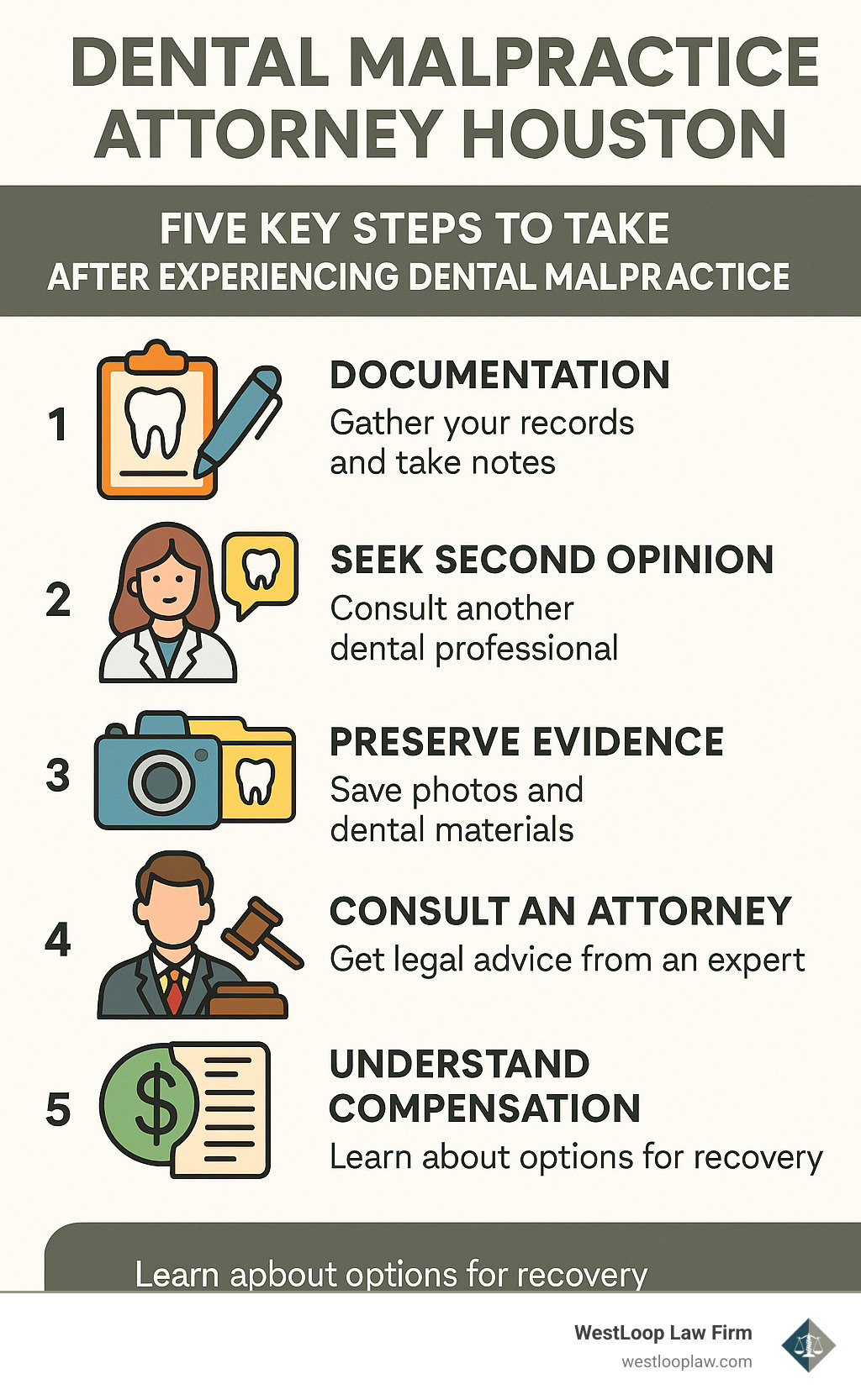When Dental Care Goes Wrong: Finding Justice in Houston
Dental malpractice attorney Houston specialists are legal professionals who represent patients harmed by substandard dental care. If you’ve been injured during dental treatment in Houston, here’s what you need to know:
- Definition: Dental malpractice occurs when a dentist fails to provide the appropriate standard of care, resulting in patient harm
- Time Limit: You generally have two years to file a claim in Texas
- Damages Cap: Non-economic damages are capped at $250,000 per provider in Texas
- Proof Required: You must establish duty of care, breach of standard, injury, and causation
- Common Cases: Extraction errors, nerve damage, anesthesia complications, missed diagnoses
“We trust dentists to fix our smiles and keep our mouths healthy. But sometimes, things go seriously wrong in the dental chair,” notes a prominent Houston dental malpractice attorney.
Dental procedures are inherently invasive, and when proper care isn’t followed, they can result in serious, life-altering injuries. In 2019 alone, the Texas State Board of Dental Examiners received 1,090 complaints, with 39 resulting in malpractice disciplinary actions. These cases often involve severe nerve damage, infections, wrongful tooth extraction, or even fatal complications.
Finding an experienced dental malpractice attorney in Houston is crucial, as Texas law creates significant barriers to recovery. Most dental malpractice suits in Texas fail unless there is extreme nerve or tissue damage. An attorney specializing in dental malpractice understands these challenges and can help determine if your case meets the threshold for legal action.
Find more about Dental malpractice attorney Houston:
– Texas medical malpractice lawyer
– hospital negligence lawyers
– medical mistakes lawyers
Understanding Dental Malpractice & Texas Law
When you sit in that dental chair, you’re placing enormous trust in your provider. But what happens when that trust is broken? Dental malpractice occurs when a dental professional fails to provide care that meets the accepted standard in the dental community, resulting in patient harm. Here in Texas, these cases fall under Chapter 74 of the Civil Practice and Remedies Code – the same laws that govern all medical liability claims.
The standard of care isn’t about perfect dentistry – it’s about what a reasonably careful dentist would do in similar circumstances. When your dentist falls short of this standard and you suffer as a result, that’s where the law steps in.
We regularly see patients who’ve experienced extraction errors (like removing the wrong tooth), anesthesia complications, serious infections from poor sterilization practices, nerve damage, missed diagnoses, unnecessary procedures, or injuries from improper tool usage. These mistakes can change lives forever.
If you believe you’ve been harmed, the Texas State Board of Dental Examiners (TSBDE) can receive your complaint. While this won’t get you compensation, it’s an important step for accountability. You can file a formal complaint with the TSBDE while also speaking with a dental malpractice attorney Houston about pursuing compensation for your injuries.
How Failure to Treat a Diagnosed Problem Becomes Malpractice
Let’s say your dentist correctly identifies a serious dental issue—maybe an infection, a problematic wisdom tooth, or signs of advanced gum disease. If the dentist drops the ball at this stage and doesn’t take appropriate action, that’s more than just bad service—it may be malpractice.
Failure to treat can take many forms. Sometimes, it means not informing you about a serious problem they’ve discovered. Other times, it’s failing to recommend the necessary follow-up procedure, neglecting to prescribe essential medication, or just not referring you to a specialist when your case requires expertise beyond their own.
When a dentist sits on a diagnosis without acting, those untreated conditions can quickly spiral, causing pain, permanent damage, or even systemic infections. The law recognizes this as a breach of the duty your provider owes you—if their inaction directly leads to further harm, you may have a valid case.
The Risks of Skipping a Medical History
One crucial step in safe dental care is gathering a complete medical history before any procedure begins. When a dentist overlooks this, serious risks can arise. For instance, failing to ask about medication allergies may lead to dangerous reactions if you’re given something your body can’t tolerate. If you have an underlying heart condition, skipping this important background could turn a routine cleaning or filling into a life-threatening situation.
Patients may face complications such as uncontrolled bleeding, adverse drug interactions, or unexpected infections—especially if their immune system is already compromised. It’s not just about what happens in the mouth; problems can rapidly affect your entire body. Good dentists always make medical history a top priority to protect your overall health and ensure safe, personalized care.
What Are a Dentist’s Duties to Their Patients?
Dentists have a profound responsibility to their patients—not just when wielding a drill or writing a prescription, but at every stage of care. Before a single instrument touches your teeth, a dental professional must thoroughly evaluate your oral health, correctly diagnose any issues, and make sure you completely understand your condition and the available treatment options.
This duty to educate ensures you can make informed decisions about your care. Once you and your dentist agree on a treatment plan, your dentist must perform each procedure with the skill, attention, and adherence to best practices expected in the dental field. Failing to meet these standards doesn’t just betray your trust; it can cause new injuries and complications that may have serious consequences.
Most Common Houston Dental Malpractice Scenarios
In our experience handling dental malpractice cases across Houston, certain procedures consistently lead to more claims than others:
Wisdom tooth extractions top the list, especially when performed by general dentists rather than specialists. We’ve seen cases of permanent nerve damage, fractured jaws, and even dangerous sinus perforations from these seemingly routine procedures.
Dental implant misplacement creates another category of serious harm. When implants are positioned incorrectly, patients often suffer permanent nerve damage, infections, or complete implant failure – requiring additional painful procedures.
Nerve damage during procedures represents a significant percentage of claims. A 12-year study found alarming numbers of cases involving permanent damage to the lingual nerve or inferior alveolar nerve, often leaving patients with permanent numbness, pain, or altered sensation.
Oral cancer misdiagnosis can be deadly. We represented a Houston family after their loved one’s dentist missed obvious signs of oral cancer, delaying treatment until the disease had advanced beyond effective treatment.
Pediatric fraud cases have unfortunately made headlines in Houston. In early 2024, a pediatric dental clinic faced serious allegations regarding a Medicaid fraud scheme involving unnecessary and harmful procedures performed on children.
Statute of Limitations & Damage Caps
Time is truly of the essence in Texas dental malpractice cases. You generally have just two years from the date of injury to file your claim. While there is a “findy rule” for injuries that couldn’t reasonably be finded immediately, this exception is narrowly applied by Texas courts.
Even with the findy rule, Texas imposes an absolute 10-year limit (statute of repose). For children under 12, claims can be filed until their 14th birthday. In rare cases involving fraud or intentional concealment, the clock may temporarily pause.
Perhaps most challenging for dental malpractice victims are Texas’ strict damage caps:
Non-economic damages (your pain, suffering, and emotional distress) are capped at $250,000 per healthcare provider. If multiple facilities are involved, the cap is $250,000 per facility with a maximum of $500,000 total.
Economic damages (your medical bills and lost wages) fortunately remain uncapped.
Punitive damages designed to punish especially egregious conduct are capped at the greater of $200,000 or twice your economic damages plus non-economic damages up to $750,000.
What’s particularly frustrating is that Texas juries aren’t told about these caps. They might award what they believe is fair compensation for your suffering, only to have the judge later reduce it to the statutory maximum.
At WestLoop Law Firm, we understand these complex limitations and work diligently to maximize your recovery within Texas’ legal framework. The most important thing to remember? Don’t wait. Consulting with a dental malpractice attorney Houston quickly can make the difference between receiving compensation and losing your right to file forever.
Do You Have a Valid Dental Malpractice Claim?
Not every dental appointment gone wrong qualifies as malpractice. I’ve seen many patients disappointed to learn their bad experience doesn’t meet the legal threshold. To have a valid claim in Houston, your situation needs to check four essential boxes:
- Duty of Care: Your dentist had a professional relationship with you, creating an obligation to provide care according to accepted standards
- Breach of Standard: They failed to meet the standard of care any reasonable dental professional would provide
- Causation: This failure directly caused your injury (not some unrelated factor)
- Damages: You suffered actual harm – whether physical, financial, or emotional
Texas law adds another hurdle – you’ll need an expert affidavit (called an expert report) early in the litigation process. This report must be prepared by a qualified dental professional who can establish that your case has merit. Without this crucial document, courts will dismiss your case outright.
There’s also a practical consideration most people don’t realize: the value threshold. Due to the high costs of expert witnesses and litigation, most dental malpractice attorney Houston firms will candidly advise that your damages should exceed $20,000 to make pursuing a claim financially sensible.
Confused about whether your situation qualifies? This comparison might help:
| Bad Dental Outcome | Dental Malpractice |
|---|---|
| Known risk that was disclosed | Undisclosed risk that should have been explained |
| Complication despite proper technique | Error in technique causing unnecessary harm |
| Temporary discomfort | Permanent injury or disfigurement |
| Minor infection that resolves | Severe infection from unsterile instruments |
| Need for additional standard treatment | Need for extensive corrective procedures |
| Pain despite appropriate pain management | Failure to address reported pain or complications |
| Unsuccessful procedure despite proper care | Procedure performed without proper qualification |
Examples of Compensable Injuries
Dental malpractice can cause serious, life-altering injuries. The following examples typically meet the threshold for valid claims in Houston:
Permanent Numbness or Nerve Damage often results from extraction errors or implant placement too close to nerves. I remember one Dallas case where a patient received a $10 million verdict for permanent nerve damage after a wisdom tooth extraction gone terribly wrong.
Jaw Fracture can occur when dentists use improper extraction techniques, leading to broken jaws requiring surgical repair and resulting in long-term complications that affect eating and speaking.
Severe Infection happens when providers fail to maintain sterile conditions or properly treat post-procedure infections. These can lead to hospitalization, systemic infection, or in worst cases, death.
Sinus Perforation during upper tooth extractions or implant placements can create an opening between your mouth and sinus cavity when improper techniques are used. This often leads to chronic, painful infections that are difficult to resolve.
TMJ Disorders may develop when dental work damages your temporomandibular joint, causing chronic pain, difficulty eating, and requiring extensive ongoing treatment.
Wrongful Extraction creates both physical and financial harm – you still need treatment for the correct tooth while now also needing to replace the wrongfully extracted one.
Anesthesia Complications from improper administration can cause respiratory distress, cardiac events, or severe allergic reactions that may be life-threatening.
Calculating Potential Compensation
If you have a valid claim, you may be entitled to several types of damages:
Economic Damages (not capped in Texas) include your current and future medical expenses for corrective treatment, lost wages if you missed work, loss of earning capacity if your ability to work is permanently affected, and out-of-pocket expenses related to the injury.
Non-Economic Damages (capped at $250,000 per provider) cover the human cost: physical pain and suffering, mental anguish and emotional distress, disfigurement, loss of enjoyment of life, and even loss of consortium (impact on your relationships).
Here’s a real-world example: If a dentist’s negligence caused permanent nerve damage requiring corrective surgery, medication, and therapy, you might recover $75,000 in medical expenses, $30,000 in lost wages, and up to $250,000 for pain, suffering, and permanent disability.
At WestLoop Law Firm, we work with medical and economic experts to accurately calculate the full extent of your damages. We’re careful to ensure nothing is overlooked – because you deserve compensation for everything you’ve endured, not just the obvious costs.
What to Do After Suspected Negligence
If you believe you’ve been harmed by dental negligence in Houston, taking immediate and thoughtful action is crucial for both your health and legal rights. Those first steps after an injury can make all the difference in your recovery—both physically and legally.
The moments after realizing something went wrong can feel overwhelming. You’re likely in pain, confused, and unsure what to do next. Here’s what you need to know: seek immediate medical attention from another dental professional. This not only addresses your injuries but creates that critical first documentation of harm.
While your health comes first, protecting your legal rights runs a close second. Document everything carefully—dates, conversations, and especially photos of visible injuries. Those swollen cheeks or bleeding gums that seem temporary might be important evidence later.
Texas law gives you the right to access your complete dental records. Request and preserve all records including X-rays, treatment plans, and consent forms. Don’t be surprised if the office seems hesitant—this is common, but stand firm in your legal right to this information.
Many patients make the mistake of oversharing on social media or signing releases from the dental office. Both can seriously undermine your case. Refrain from discussing your situation publicly and avoid signing any waivers without consulting an attorney first.
Your daily experience matters enormously in dental malpractice cases. Maintain a daily journal documenting your pain levels and how the injury affects everyday activities like eating, speaking, or sleeping. These personal accounts often become powerful evidence.
Remember to file a complaint with the Texas State Board of Dental Examiners. While this won’t get you compensation, it creates an official record and may help prevent others from suffering similar harm.
The clock starts ticking immediately in Texas—you generally have just two years to file a claim. Waiting too long means permanently losing your right to compensation, no matter how severe your injuries.
Reporting & Documenting Your Case
Strong documentation forms the backbone of any successful dental malpractice claim. Think of yourself as a detective gathering evidence—every detail matters.
Start by creating a detailed treatment timeline. Note your initial consultation, when the procedure occurred, when you first noticed problems, and all follow-up appointments. Include dates when you contacted the dentist about concerns and what response you received.
Your medical records tell a critical story. Gather all pre-procedure and post-procedure X-rays to show the difference. Collect treatment notes, consent forms, and billing statements. These documents often reveal discrepancies between what was planned and what actually happened.
Visual evidence can be particularly compelling. Take clear photos of any visible issues like swelling, bruising, or infection. If your speech or ability to eat is affected, consider recording brief videos showing these limitations. These visual records often communicate your suffering more effectively than words alone.
Don’t underestimate the power of tracking your daily experience. A pain diary with dates, times, and severity helps establish the ongoing impact of the injury. Note changes in your ability to work, socialize, or enjoy normal activities.
Financial documentation matters too. Keep records of all medical bills for corrective treatment, pharmacy receipts, and documentation of missed work. These create a clear picture of the economic impact of the dental negligence.
As dental malpractice attorney Houston professionals, we at WestLoop Law Firm can help you obtain records that dental offices might be reluctant to provide. We know exactly what will strengthen your case and how to properly preserve it.
When to Contact a Dental Malpractice Attorney Houston
The best time to contact a dental malpractice attorney Houston is simple: as soon as possible after you suspect negligence. Early consultation provides critical advantages that can significantly impact your case’s outcome.
Evidence has a way of disappearing over time. Records can be altered, memories fade, and witnesses become harder to locate. Early legal involvement ensures preservation of evidence when it’s most accessible and authentic.
Many clients don’t realize that dental professionals often have a team of lawyers and insurance representatives working immediately to minimize their liability. Having your own advocate levels the playing field and prevents you from being outmaneuvered.
At WestLoop Law Firm, we offer free initial consultations to evaluate your case. During this no-pressure meeting, we’ll listen to your story, examine available evidence, and give you an honest assessment of your options. You’ll leave with a clear understanding of whether pursuing a claim makes sense for your specific situation.
Worrying about legal fees shouldn’t prevent you from seeking justice. That’s why we typically work on a contingency fee basis. This means you pay nothing upfront—we only get paid if we win your case. Our fee comes as a percentage of your recovery, typically 33-40%, and we cover all case expenses like expert witnesses and filing fees during the process.
This arrangement makes quality legal representation accessible regardless of your financial situation. Learn more about the benefits of hiring a medical malpractice lawyer and how we can help you steer this challenging time.
The path to recovery after dental negligence isn’t one you should walk alone. With the right legal partner, you can focus on healing while we handle the complex legal process of securing the compensation you deserve.
How a Dental Malpractice Attorney Houston Guides Your Case
When you’re dealing with dental injuries, having a dedicated dental malpractice attorney Houston by your side makes all the difference. At WestLoop Law Firm, we don’t just push papers—we stand with you every step of the way, offering genuine support during what’s often a painful and confusing time.
Our approach begins with a thorough investigation. We’ll sit down with you, your family members, and any witnesses to understand exactly what happened in that dental chair. We then consult with top dental experts who can pinpoint where your care fell short of acceptable standards. Every medical record gets careful review, and we research similar cases to build the strongest possible argument for you.
Finding the right experts is crucial in dental malpractice cases. We work with qualified dental specialists who can clearly explain complex procedures to judges and juries. These experts prepare detailed reports that satisfy Texas legal requirements, stand firm during questioning, and effectively counter the defense’s experts.
“Many clients come to us feeling powerless against insurance companies,” says one of our senior attorneys. “Our job is to level the playing field and make sure your voice is heard.”
When it comes to negotiation, we calculate the true value of your claim—including future expenses you might not have considered. We prepare compelling demand packages backed by solid evidence and aren’t intimidated by insurance adjusters’ tactics. If they offer less than you deserve, we push back with facts, not empty threats.
Should your case need to go to trial, we handle everything from filing court documents to preparing you for testimony. We create clear exhibits that help jurors understand your injuries, present persuasive opening and closing arguments, and skillfully cross-examine defense witnesses.
You’ll never worry about upfront costs with us. We advance all expenses—expert witness fees, record retrieval costs, court filing fees, and deposition expenses. We only recover these costs if we win your case, meaning there’s no financial risk to you.
For more information about our approach to these complex cases, visit our Houston Medical Malpractice Lawyers page.
The Legal Process Step-by-Step in Houston Courts
Dental malpractice cases follow a specific path through Houston’s legal system. Understanding this journey helps set realistic expectations about timing and outcomes.
Everything starts with a pre-suit notice. Texas law requires sending a formal letter to the dentist at least 60 days before filing a lawsuit. This letter outlines your claim and gives the dentist a chance to settle before litigation begins. Sometimes, this step alone leads to a fair settlement.
If the case proceeds, we must file an expert report within 120 days of filing your lawsuit. This critical document establishes the standard of care, how it was breached, and how this caused your injuries. The courts are strict about this requirement—if the report is late or inadequate, your case will be dismissed.
The findy phase comes next, where both sides exchange information. This includes written questions (interrogatories), document requests, and recorded testimonies (depositions). This phase typically takes 6-12 months and builds the foundation of your case.
Most Houston courts require mediation before trial. Think of this as a formal negotiation with a neutral third party helping both sides find common ground. Many cases settle at this stage, sparing you the stress of a trial.
If settlement isn’t reached, we proceed to trial, which typically lasts 3-5 days for dental malpractice cases. A jury decides whether malpractice occurred and determines damages. After a verdict, the judge may reduce non-economic damages to comply with Texas caps, and either side may appeal.
From start to finish, most cases take 1-3 years, though complex situations can take longer. Throughout this journey, we keep you informed and prepared for each step.
Who May Be Liable
Dental injuries often involve multiple responsible parties. Identifying all of them is crucial for maximizing your recovery, especially given Texas damage caps.
The dentist who performed the negligent treatment is typically the primary responsible party. However, dental hygienists or assistants may share responsibility if they performed care below standard or failed to alert the dentist to problems.
The dental practice or clinic itself can be liable under a legal principle called “respondeat superior,” which holds employers responsible for employee negligence during work duties. This is particularly important in cases involving corporate dental chains.
When anesthesia complications arise, the providers who administered it improperly may be separately liable. Similarly, if defective dental tools, materials, or medications contributed to your injury, the manufacturing companies may bear responsibility.
Don’t forget about referral specialists. If your dentist sent you to another professional who provided negligent treatment, that specialist may also be liable.
At WestLoop Law Firm, we conduct thorough investigations to ensure every responsible party is identified and held accountable. We leave no stone unturned in our pursuit of justice for our clients who’ve suffered from dental negligence.
Frequently Asked Questions about Dental Malpractice in Houston
What is the difference between a bad dental outcome and malpractice?
When your dental procedure doesn’t go as planned, you might wonder if you’ve experienced malpractice or just an unfortunate outcome. This distinction is crucial, and it’s not always black and white.
A bad outcome happens when things don’t work out perfectly despite proper care. Think of it as rolling the dice and getting an unlucky number—even when your dentist did everything right. Maybe you developed a dry socket after an extraction or experienced some discomfort that was disclosed as a possibility beforehand. These situations, while frustrating, don’t necessarily mean your dentist did anything wrong.
Malpractice, on the other hand, occurs when your dentist fails to provide the care that any reasonable dental professional would have in the same situation. This might include extracting the wrong tooth (yes, this happens!), causing preventable nerve damage, or performing a procedure they weren’t properly trained to handle.
“I often tell clients to consider whether another competent dentist would have done things differently,” explains a dental malpractice attorney Houston at WestLoop Law Firm. “That’s often the key to distinguishing between an unfortunate complication and true negligence.”
The presence of informed consent also matters significantly. If your dentist warned you about a specific risk that then occurred, that’s different from suffering a complication you were never told about.
How long will a Houston dental malpractice lawsuit take?
Patience is definitely a virtue when it comes to dental malpractice lawsuits. While every case is unique, most follow a similar timeline in Houston:
The journey typically begins with a 1-3 month investigation period where we gather your records and consult with dental experts. Texas law then requires a 60-day notice period before officially filing your lawsuit. Once filed, we have 120 days to prepare and submit an expert report supporting your claim—a critical step that can make or break your case.
The findy phase follows, usually lasting 6-12 months, where both sides exchange information and take depositions. Most cases then proceed to mediation, where settlement discussions occur with a neutral third party. If settlement isn’t reached, we’ll spend 2-3 months preparing for trial, which typically lasts less than a week.
All told, most dental malpractice cases resolve within 1-3 years from start to finish. The good news? About 90% settle before trial, which can significantly speed things up.
“While I wish I could tell clients their case will be resolved quickly, the reality is that thoroughness matters more than speed,” notes our dental malpractice attorney Houston. “We never want to rush a case at the expense of maximum compensation.”
Factors that might extend your timeline include case complexity, court backlogs, expert witness scheduling conflicts, and defense delay tactics. Throughout the process, we’ll keep you informed of exactly where your case stands and what to expect next.
How much does it cost to hire a malpractice lawyer?
One of the biggest concerns for dental malpractice victims is whether they can afford quality legal representation. The good news? At WestLoop Law Firm, we’ve structured our fees to ensure everyone has access to justice, regardless of their financial situation.
We work exclusively on a contingency fee basis for dental malpractice cases. This means your initial consultation is completely free, and you’ll never pay us attorney fees unless we win your case. If we secure compensation for you, our fee is typically 33-40% of your recovery—a standard range for specialized litigation.
What about all those expenses that come with building a strong case? We cover those too. From expert witness fees (which can run $350-$750 per hour) to medical record retrieval, filing fees, deposition costs, and exhibit preparation—we advance all these expenses. You only reimburse these costs if we win your case.
Because of the significant investment required to properly litigate these cases, most dental malpractice attorney Houston firms (including ours) typically only accept cases where potential damages exceed $20,000-$25,000. This threshold ensures that after expenses and fees, you’ll still receive meaningful compensation that makes the process worthwhile.
“We believe that justice shouldn’t depend on your bank account balance,” says our lead attorney. “That’s why we take on all the financial risk—so you can focus on healing while we focus on fighting for what you deserve.”
For more information about how we can help with your dental malpractice case, visit our Houston Medical Malpractice Lawyers page.
Conclusion
Dental malpractice cases in Houston present unique challenges that require specialized knowledge to steer successfully. Texas laws create significant problems—from strict filing deadlines to damage caps and complex expert report requirements—that can make seeking justice feel overwhelming when you’re already dealing with pain and trauma.
If you’ve suffered harm from substandard dental care, there are critical steps you need to take to protect your rights and future wellbeing:
Act quickly after an injury. The two-year statute of limitations clock starts ticking immediately in most cases, and waiting too long can permanently bar your claim, regardless of how serious your injuries are. Many patients don’t realize how quickly this window closes until it’s too late.
Document everything related to your injury and treatment. Those photos of your swollen face, your daily pain journal, and your collection of medical records aren’t just for your records—they become powerful evidence that can make or break your case when it matters most.
Seek specialized counsel with dental malpractice experience. This isn’t the time for a general personal injury attorney who handles car accidents and slip-and-falls. Dental cases require someone who understands both dental standards of care and Texas’s specific medical malpractice laws.
Understand the value threshold before proceeding. We’re always honest with our clients about this reality: cases typically need to exceed $20,000 in damages to be economically viable given the high costs of expert witnesses and litigation. Not every bad outcome, even painful ones, will meet this threshold.
Be prepared for a process that requires patience. From thorough investigation through potential trial, these cases don’t resolve overnight. The journey to justice takes time, but having the right guide makes all the difference.
At WestLoop Law Firm, we bring together medical knowledge and legal expertise to effectively advocate for dental malpractice victims in Houston. We understand that dental injuries affect more than just your physical health—they impact your ability to eat, speak, and even feel confident in social situations. Our team is committed to helping you rebuild not just your smile, but your entire life.
Don’t let a preventable dental injury define your future. You trusted your dentist with your care, and when that trust was broken, it’s natural to feel betrayed and uncertain about what comes next. Our dental malpractice attorney Houston team is here to help you find answers, seek accountability, and secure the compensation you need for proper corrective treatment.
Contact us today for a free, no-obligation consultation to discuss your unique situation and explore your options for justice and fair compensation. Learn more about our Houston Medical Malpractice Lawyers and how we can help you smile again—both literally and figuratively.






